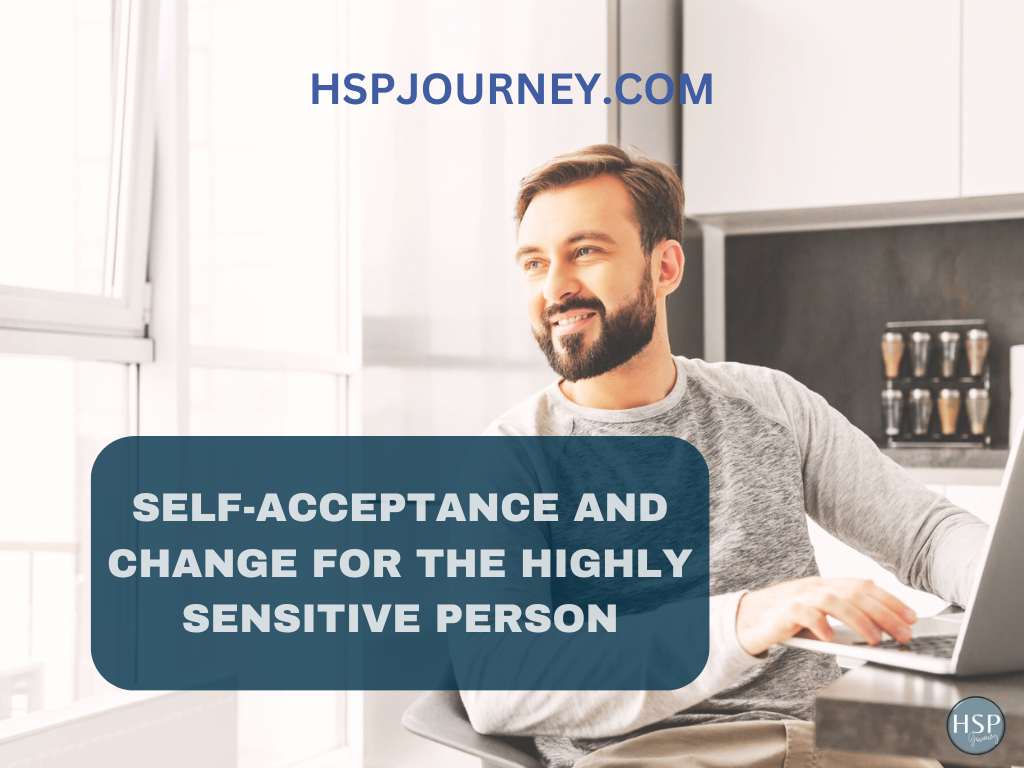I suspect that there is no one alive who wouldn’t prefer to feel more accepting of themselves. After all, there’s nothing pleasant about being harsh and critical of ourselves. We get enough of that from the world around us. Yet, at the same time as we’d like to be more self-accepting, most of us would be happiest if we could change all the things we dislike about ourselves. HSPs are no exception to getting pulled into a tug of war between self-acceptance and change.

Table of Contents
How High Sensitivity Makes the Struggle with Self-Acceptance and Change Even Harder
HSPs may be particularly aware of the discomfort of not measuring up to the standards we set for ourselves. By nature, we tend to think about things more deeply than non-highly sensitive people. We are often drawn to thinking about things until we can figure them out, which becomes a trap when we are trying to reconcile seemingly opposite stances like self-acceptance and changing ourselves.
When we get into this kind of mental quandary, we’re likely to begin to feel overstimulated and overwhelmed. Our already active nervous systems find it difficult to relax, making it even harder to get out of our mental spiral. No wonder that some of us prefer to bury our heads in the sand and avoid thinking about either accepting ourselves as we are or making changes in our lives.
Why It’s Worth Grappling with Self-Acceptance and Change as a Highly Sensitive Person
Unfortunately, HSPs aren’t really cut out for staying in a state of indefinite avoidance and denial. We’re too aware of the truth: there must be a way to practice self-acceptance and change.
Here are three potential benefits to allowing yourself to explore the discomfort of the tug of war between self-acceptance and change:
1. Self-acceptance is unconditional love for yourself.
HSPs often excel at loving others unconditionally, but we may struggle to give ourselves that same unconditional love. Practicing self-acceptance is a way of turning our empathy and caring inward, viewing ourselves with the same compassion and grace with which we view others. “Unconditional” means seeing ourselves accurately, as a mixture of positive and negative qualities, with a history filled with both accomplishments and missteps, regrets, and errors. Self-acceptance can give us the same good feelings that we get from being unconditionally loved by others—without being dependent on someone in our lives to give us this validation. We see ourselves as we truly are, and it feels wonderful to be seen in this way.
2. Self-acceptance can make it easier to change.
When we truly accept the complexity of who we are, we can begin to take stock of what changes we truly want to make. It becomes easier to let go of the “shoulds” and “oughts” of the world (as well as the ones we have internalized). We make the right changes for us, for the right reasons, at the right time—we do what is “right” based on our highly personalized sense of self. We can step out of the tug of war between self-acceptance and change, knowing that, simultaneously, we have both self-worth and potential for growth and improvement.
3. Change can bring us to greater self-acceptance.
Some changes feel particularly taxing because they do not fit who we are. Even if we succeed in making the change, it might never feel natural or comfortable, because we are acting out of a false self. On the other hand, changes that reflect our true selves feel natural once they’re made. Let’s take the example of someone who wants to save money for retirement. If that person hates to cook but decides to do a “no restaurant” month to save money, that change will be painful and hard to sustain, leaving the person feeling dissatisfied. On the other hand, if that person chooses to stop driving to work and ride their bike, which is fun and supports their lifestyle goals, that change is easier and more pleasant to sustain. When the changes we make move us into greater alignment with our values and genuine selves, we naturally develop greater self-acceptance.
Looking for HSP Tools to Thrive in a Chaotic World?
The modern world is often overwhelming and stressful for those of us with sensitive nervous systems. Many of us have suffered from the challenges of high stress, anxiety, sensory overload, and mental health and physical health issues. Fortunately, after years of working with and researching Highly Sensitive People (HSPs), Julie Bjelland has developed many tools that have not only helped her but thousands of HSPs all over the world move out of survival mode living and into thriving. In this free webinar, she’ll share the tools that HSPs have found the most life-changing. Her goal is to help you live to your fullest potential because the world needs you.
Join this free webinar and get tools to help you thrive as an HSP!
Ways to Explore Self-Acceptance and Change in Your Own Life
If I’ve convinced you that it may be worth exploring your own relationship to self-acceptance and change, you may be wondering how exactly to do that. After all, the insight alone is probably not enough to get you started. Here are five suggestions you can start to use right away:
- Become curious about how the tug of war between self-acceptance and change shows up in your life. What pulls you strongly in one direction or another? What interferes with a decision you made to either accept or change something in your life? Can you see what would help you with each end of this spectrum? Your answers will reveal your next steps.
- Is there a way that you can gently approach your high sensitivity, rather than trying to control it or deny it? When we can befriend parts of ourselves, we create space to accept those parts, just like we accept friends who may be very different people from us. We free up the energy of judgment to do other things, whether that is working toward self-acceptance or setting down the path of change.
- Talk with someone you trust about how they handle issues of self-acceptance and change. It may be an unusual conversation to start, but I can assure you from sitting with hundreds of clients that this is a common human struggle. If you do not have someone you can have this conversation with, finding a group for HSPs online or in person. Having support can reduce your sense of being alone with this struggle and may help you find creative ways of approaching both your efforts to accept yourself and make changes.
- Explore how your spirituality can help you navigate self-acceptance and change. Many HSPs have deep connections to spirituality, whether that’s in the form of organized religion, connection to the natural world, or individual spiritual practices. Themes of accepting ourselves and others while we work to become a better version of ourselves run through many of these traditions. Similarly, groups based on the Twelve Steps can point us toward ways to navigate this path. Many people find support in the Serenity Prayer (using whatever understanding of God or a Higher Power fits them): God, grant me the serenity to accept the things I cannot change, the courage to change the things I can, and the wisdom to know the difference.
- Work with a therapist, coach, or spiritual director who has experience with highly sensitive people. Helping professionals are accustomed to assisting HSPs in walking the tightrope between self-acceptance and change. By working with someone with a specialized background in high sensitivity, you will spend less time explaining who you are as an HSP and what might feel overwhelming, leaving you more time to focus on becoming the person you’d like to be: someone who can make changes while holding deep acceptance and compassion for themselves.

Looking for an HSP-Trained coach to help you align your life with your priorities?
Through my Highly Sensitive Person (HSP) certification with the Nickerson Institute, as well as being an HSP, I offer HSP coaching to develop specific goals around your HSP needs. We HSPs frequently deal with anxiety and overstimulated nervous systems that prevent us from achieving peace and attaining our life goals. HSP coaching with me includes a detailed review of your sensitivities and a mutually-desired plan for growth and management of this superpower to shift negativity and begin seeing yourself as the hero of your own story. [Coaching packages start at $150 per month.]
A Final, Self-Guided Resource for Working on Self-Acceptance and Change
Working these issues can be a long and complicated process. Sometimes we may have trouble opening up to others about what feels unacceptable about ourselves. We may also struggle as HSPs to express what we truly want to change in our lives. It may not feel safe yet to do this work with other people.
That’s why I created “Self-Acceptance and Change: A Guided Journal for Highly Sensitive People”. This resource uses the Singularly Sensitive approach to guide you to explore these topics in greater depth. You’ll be invited to experiment with making changes in your thinking, behavior, and relationships. Then, you’ll create ways to integrate what you are learning into your overall sense of who you are as a highly sensitive person and how you can reach your goals.
I know that it’s not easy to become more accepting of our sensitivity. It took me years to get to a point where I can embrace my sensitivity as a key part of who I am, for all its benefits and challenges. I used all the strategies I suggested here, and I’m still a work in progress, since new things come up as I grow and my life evolves that push me to reach new areas of self-acceptance.
And change? That’s hard for all of us, therapists included! I look at the work we do to accept ourselves as one of the most important changes we can make. Letting go of self-criticism and doubt open up so much opportunity for us to become the authentic version of ourselves that the world deserves to see. Bring self-compassion and gentleness to the change process and do it in a way that works for you as an HSP. Don’t let yourself get stuck for too long. The results are worth the effort as you build your Singularly Sensitive lifestyle.
Be sensitive, be free
*This post contains affiliate links and I will be compensated if you make a purchase after clicking on my links*




